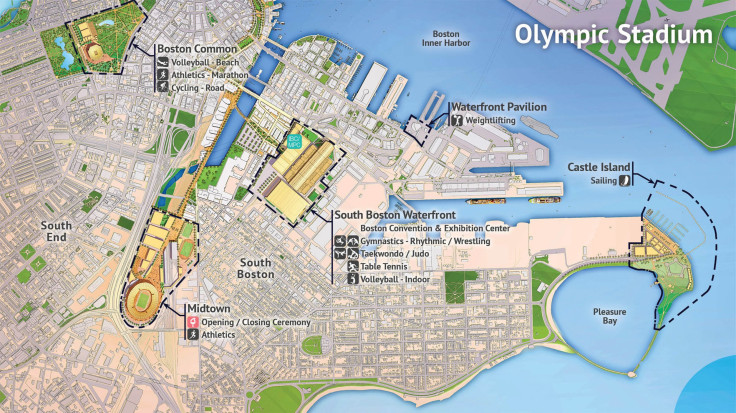
On Monday, Boston mayor Marty Walsh refused to support the city's bid for the 2024 Olympic Games and Paralympic Games. The decision follows a concerted effort on the part of community activist groups, who argued against Boston’s bid as a 2024 Olympic host city. Walsh cited concerns about cost overruns, saying that he wouldn’t sign a contract put forth by Boston’s organizing committee for the 2024 Games, even if it meant that Boston would ultimately lose its Olympic bid.
“I refuse to mortgage the future of the city away,” Walsh told reporters at a news conference, according to the Boston Globe . “I will not sign a document that puts one dollar of taxpayers money on the line for one penny of overruns on the Olympics," he added, according to the AP.
What are the arguments against Boston or any other city hosting the Olympics in 2024? We’ve got a running list below, starting with those “cost overruns.” There are plenty of arguments for Boston hosting the 2024 Olympics. If readers find this “arguments against” article useful, we’ll definitely do a follow-up. One of those “arguments for” is that the city won’t have to pay any money for the Olympics. In theory, it will all be funded by private money: tickets sales, media rights, endorsements and privately funded building contracts. However, what Walsh is refusing to sign is a promise that that the city will cover any costs that private funders fall though on.
Economics Costs Part 1
1) Private funding can fall through.
“It’s one thing to have a nice idea and to say ‘okay, the private sector is going to cover this,’ it’s another thing to have hard contracts that stipulate and require the private sector to do that,” explains Andrew Zimbalist, economics professor at Smith College and author of Circus Maximus: The Economic Gamble Behind Hosting the Olympics and the World Cup, in a video produced by the group No Boston Olympics. “And even when you have hard contracts there’s really ultimately no guarantee because [...] those companies can go bankrupt or back out of the contract on some other pretext.”
2) Historically, cost overruns have been inevitable in pasy Olympic games.
Whatever potential cost Bostonians are looking at now, it’s likely to go up.
3) Final tab of the 2024 Boston Games could reach $15-$20 billion.
Considering Beijing 2008 cost $40 billion and some are estimating London’s tab at $37 billion , this is a conservative figure.
4) The U.S. government is unlikely to help with the tab.
Unlike China (Beijing 2008) or Brazil (Rio de Janiero in 2016), the federal government won’t pick up the tab for the Olympics. Even though it’s a prestigious event for a nation to host (an argument that might help justify the cost in countries looking for recognition), the price tag stays with the city.
5) Groups like No Boston Olympics argue that the city could spend its billions on other things like public transit, housing, etc.
Public Support, Terrorism
6) Only 40 percent of Boston residents support the 2024 Olympic bid.
Successfully bidding cities in the past have achieved public support of 65-80 percent .
7) Terrorism concerns
After the Boston Marathon Bombing, the city leaned in and successfully hosted the event again. Are they comfortable with the risk of hosting an event as a not just a part of the U.S., but a symbol of it? The possibility of a terrorist attack certainly falls in the “con” list.
8) Police militarization
Pointing to police actions ahead in other host cities, critics argue that the 2024 Olympics would serve as a Trojan Horse for militarization of law enforcement and social injustice in vulnerable communities.
“The Olympics, time and again according to a slew of academic research, have revealed themselves to be defined by debt, displacement, and the militarization of public space alongside attendant spikes in police brutality,” writes David Zirin , author of “Game Over: How Politics Has Turned the Sports World Upside Down and a regular contributor to The Nation.
9) Gentrification
Zirin’s phrase “displacement” alludes to a product of gentrification. The Olympics requires lots of new building. Areas slated for construction could lead to low-income residents being forced out by developers and land value increases around the new developments could price out by the market.
Economic Cost Part 2
10) Short-term, Boston’s economy is likely to take a hit.
Sure, lots of sports fans would come to town for the Olympics, buy food and stay in hotels, but critics of the 2024 Boston bid point to studies that say cities experience a net drop in tourism and local spending. The argument goes like this: people who normally would visit the city don’t go, because they anticipate Olympic crowds.
11) Long-term, Olympics might not create much interest in Boston tourism.
According to Zimbalist that’s because people tell their friends about the games (something no one can do again) but don’t visit permanent tourist destination (something they could get their friend excited about). Also, unlike Sochi, Russia, Boston already has name recognition.
12) Jobs created by Olympic construction projects will have high costs and might not support Boston business.
Zimbalist also argues that last-minute scrambling to finish construction outstrips local contracting abilities and inevitably requires outside help.
© 2025 Latin Times. All rights reserved. Do not reproduce without permission.



